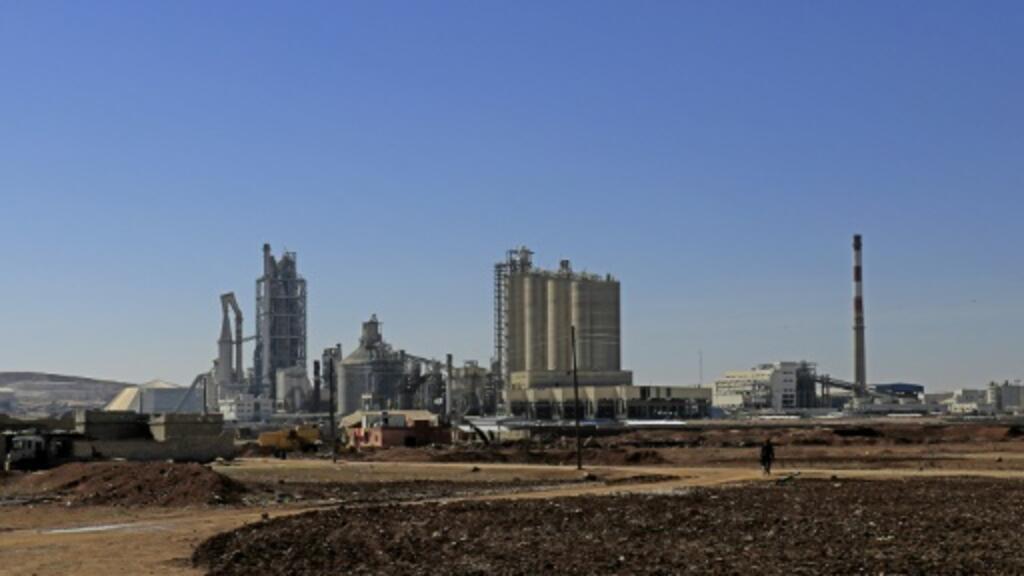
In what is shaping up to be a landmark case in France, the multinational cement giant Lafarge, along with several former senior executives are set to go on trial on Tuesday, accused of paying off jihadist groups – including the so-called Islamic State – to keep a Syrian cement plant running at the height of the country’s civil war.
The case, which opens on Tuesday at the Paris criminal court, marks the first time a French company has faced trial on terrorism financing charges.
Alongside the company, which was absorbed in 2015 by the Swiss group Holcim, stand ex-CEO Bruno Lafont, five former managers from the operations and security teams, and two Syrian intermediaries – one of whom remains at large under an international arrest warrant.
Prosecutors allege that between 2013 and 2014, Lafarge’s Syrian subsidiary – Lafarge Cement Syria (LCS) – funnelled several million euros to armed factions in northern Syria, including the Islamic State armed group and Jabhat al-Nusra, both classed as terrorist organisations.
The goal, investigators say, was to maintain operations at its €680 million (€584 million) cement plant in Jalabiya, completed just a few years earlier in 2010.
French judges order trial of Lafarge over terror financing at plant in Syria
Staying in Syria as others fled
While most multinationals pulled out of Syria by 2012 as violence escalated, Lafarge only evacuated its foreign staff that year – keeping hundreds of Syrian employees on the job until September 2014, when IS finally seized control of the plant.
During that perilous period, Lafarge’s local subsidiary allegedly paid middlemen to buy raw materials from jihadist groups and to secure safe passage for workers and goods through rebel checkpoints.
The affair first came to light in 2016 through media investigations and two formal complaints – one filed by the French economy ministry for breaching sanctions, and another by NGOs including Sherpa, the European Center for Constitutional and Human Rights (ECCHR), and eleven former Syrian employees. A full judicial inquiry was opened in 2017.
By then, Lafarge had merged with Holcim and the new group was quick to distance itself from the scandal, stressing it had “no connection” with events prior to the merger.
It even commissioned an internal probe by law firms Baker McKenzie and Darrois Villey, which in 2017 confirmed “serious breaches” of Lafarge’s own code of conduct.
Across the Atlantic, things moved faster. In October 2022, Lafarge SA pleaded guilty in a US court to conspiring to provide material support to terrorist organisations.
The company admitted paying nearly $6 million (€5.1 million) to IS and Jabhat al-Nusra, and agreed to a $778 million fine (€662 million) – a deal that angered several of the French defendants.
French court confirms Lafarge can be charged over Syria crimes
'Shadows to be cleared up'
Former CEO Bruno Lafont, who denies ever knowing about the payments, has denounced the American plea deal as a “blatant attack on the presumption of innocence.” His lawyers argue that it unfairly scapegoats former executives to protect corporate interests, and say the Paris trial will finally help “clear up the shadows” – notably around what role, if any, French intelligence services might have played.
Investigating judges have acknowledged that information was shared between Lafarge’s security officers and French intelligence about the situation on the ground. However, they concluded this did not amount to any “approval by the French state” of Lafarge’s alleged financing of terrorist entities.
More than 240 civil parties have joined the case – among them former Syrian employees eager to tell their stories at last. “Over ten years later, they will finally be able to describe what they endured – the checkpoints, the kidnappings, and the constant threat to their lives,” said Anna Kiefer of Sherpa.
If convicted of financing terrorism, Lafarge could face a fine of around €1 billion, while the penalties for violating the international embargo are potentially far higher – up to ten times the value of the illicit transactions.
This comes as a separate investigation remains open into complicity in crimes against humanity, examining whether Lafarge’s actions indirectly supported atrocities committed by jihadist groups in Syria and Iraq.
(with newswires)






